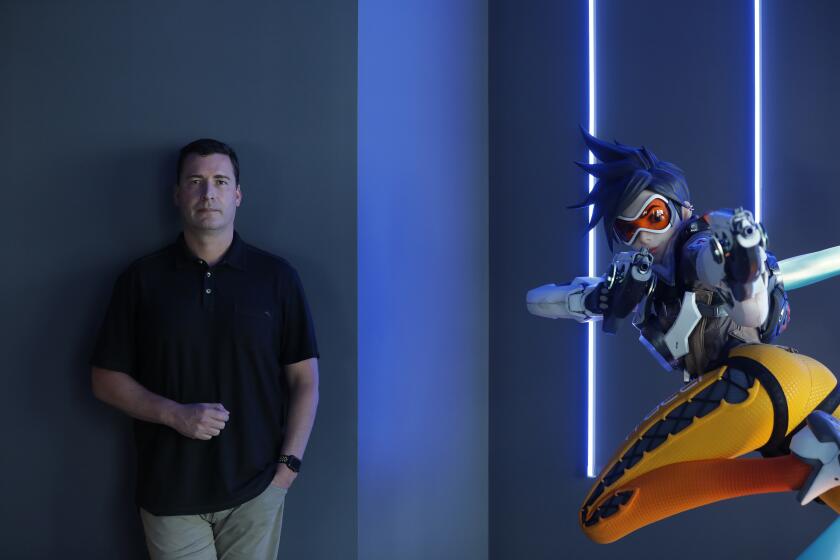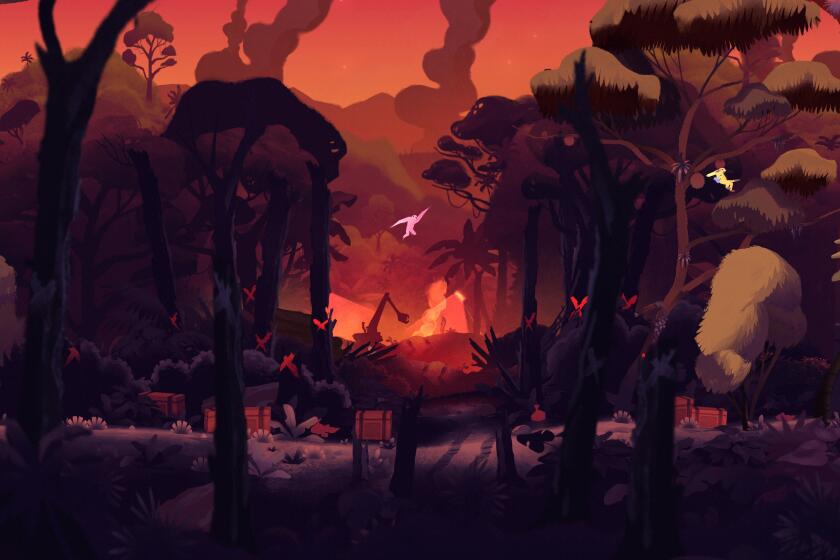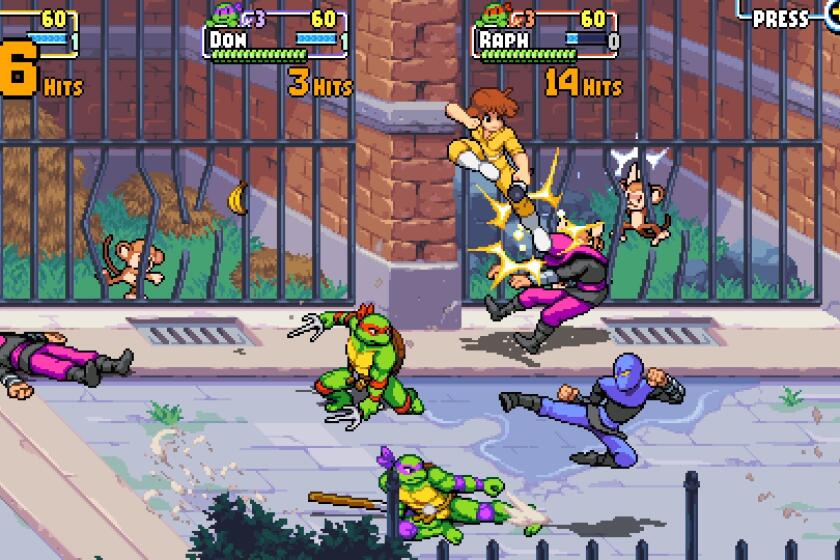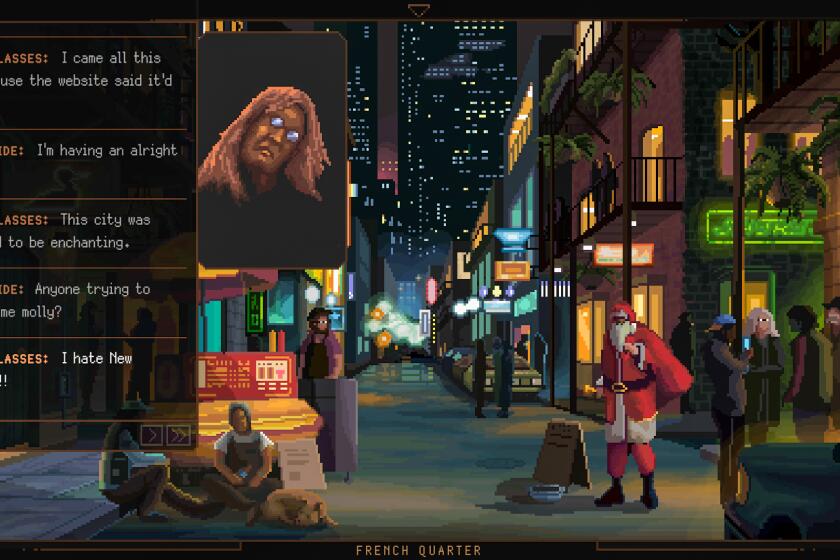Surprise! One of this year’s more delightful video games is an interactive escape room
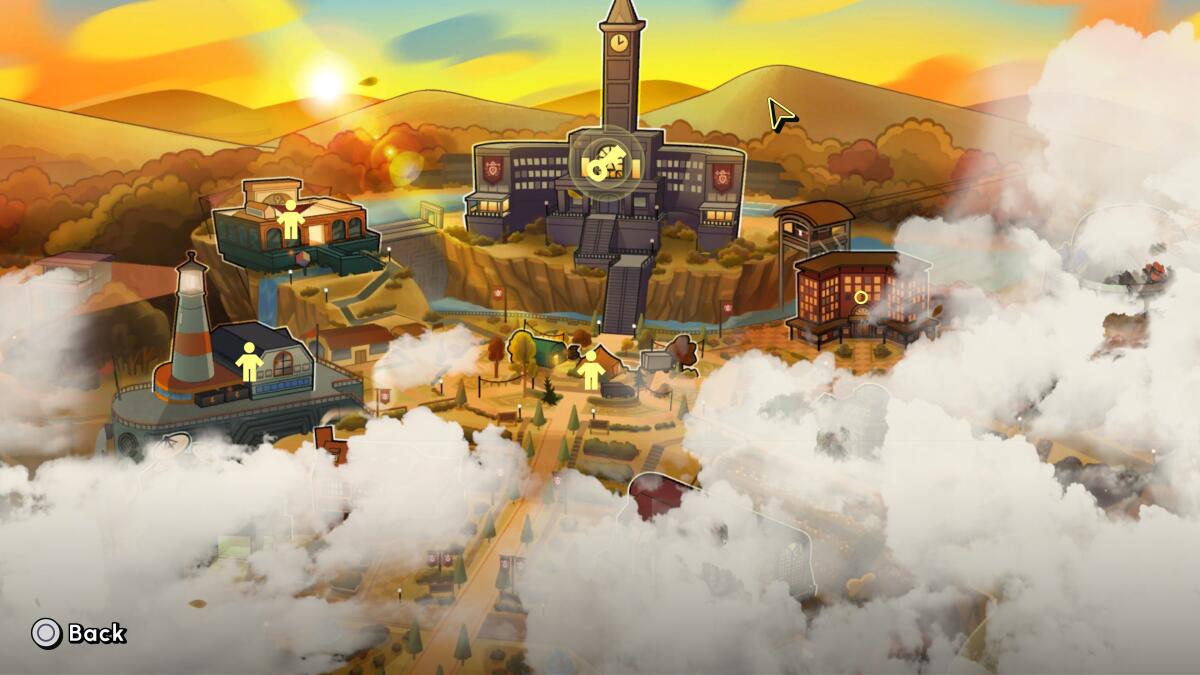
- Share via
Coin Crew Games was created with a love for play in physical, real-world spaces. Since the beginning, the local firm had a mission: to prove those boxy arcade games never went out of style.
Video games to the Coin Crew team meant virtual worlds that were silly, borderline absurd, heavily social and, hopefully, wildly addictive. All of it was designed to nod to an anything-goes era of gaming when the medium was new and a premium was placed on wackiness. Games from Coin Crew needn’t make sense. How about competitive bowling amid spaceships and cowboys? Sure. And their desired audience? “Small children” and “drunk adults,” according to the “Battle Bowling” pitch.
As if it wasn’t clear, there was no big theme of “universal morality,” says Coin Crew co-leader Wyatt Bushnell. Adds partner Mike Mohammed Salyh, “I think having a lighthearted tone can break down barriers.”
Ah, so there is a thesis behind the Coin Crew childishness: Games, Bushnell and Salyh believe, are for everyone.
But if “Battle Bowling” and prior arcade game “Hot Wheels: King of the Road” were both crazily fast-paced and all about celebratory, party-focused play with instantaneously approachable controls, Coin Crew matured a bit during the pandemic. The team’s first proper home video game, “Escape Academy,” takes Coin Crew’s love of group-focused games and adds a slightly mysterious narrative with some truly vexing puzzles. By setting the game in a university dedicated to escape rooms, the team had its pick of colorful settings in which to set its participatory challenges — think spacey computer labs, ornate Hogwarts-style libraries and cafeterias with antidotes to poison potions on the menu.
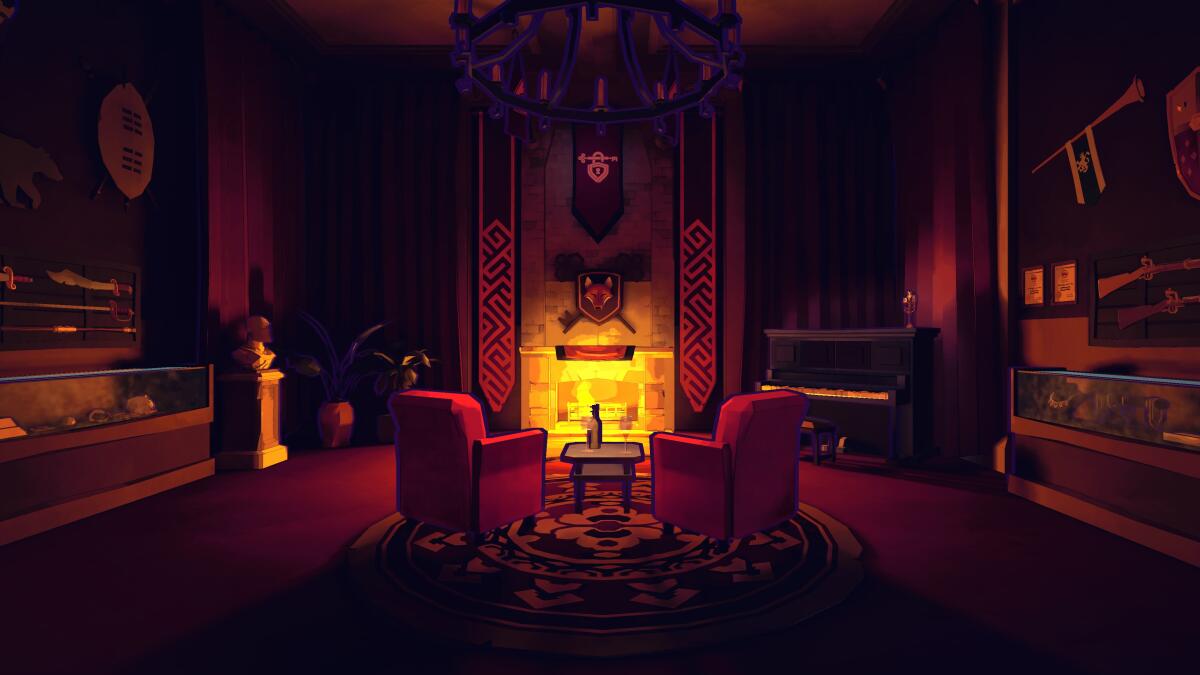
“Escape Academy” is best with others, and it’s recommended to have paper and a pencil on hand. More than an escape room translated to home computers and Xbox and PlayStation video game consoles, “Escape Academy” has a light narrative that will recall the point-and-click adventure games of yore — think LucasArts titles such as “The Secret of Monkey Island” — as it places its puzzles in a lively, slightly comic setting with an exaggerated cast of characters. And it’s designed to minimize frustration, complete with a built-in hints system and a forgiving countdown timer that lets puzzles be extended rather than forcing players into laborious retry modes.
If Coin Crew once bragged that its arcade games were potentially enhanced with the consumption of alcohol, consider “Escape Academy” welcoming and tolerant to game and puzzle novices, as well as the sort of title that begs to be played with friends, romantic partners and families, no additive substances needed. None of that means its puzzles are easy, but it is blissfully approachable, the sort of game designed for sitting on a couch and passing a controller around. In other words, it’s the rare 2022 console video game meant to be shared with gamers and nongamers alike, a reflection of Coin Crew’s everyone-in ideology informed by working in the arcade sector.
“Whenever we would do a playtest, we were like, ‘What part is the bummer here?’” says Bushnell, the son of Atari co-creator Nolan Bushnell. “Let’s do less of the bummer. That was our development philosophy.”
Such a doctrine spoke to iam8bit, the local marketing firm, gallery and video game collectibles dealer. With “Escape Academy,” iam8bit, a company known best for its work in issuing video game soundtracks, is venturing for the first time into the game publishing business. There will be more to come, say co-owners Jon Gibson and Amanda White, but for now, think of “Escape Academy” as the company’s own thesis statement for what it hopes to bring to the video game space.
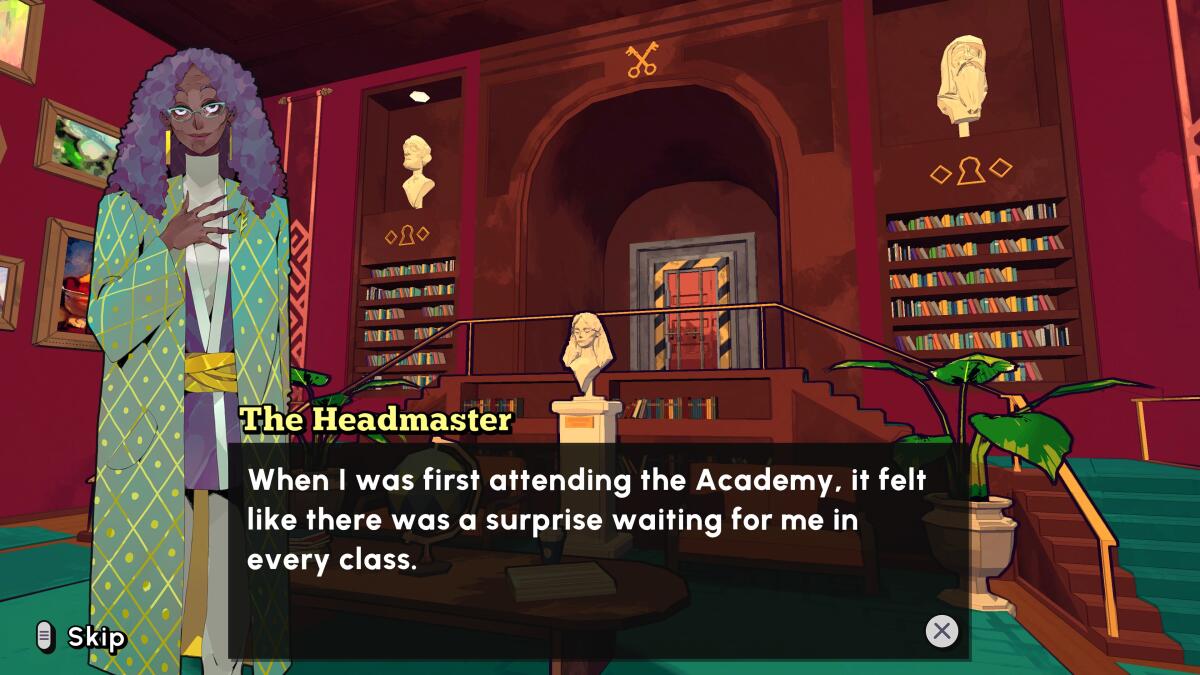
Over the years, iam8bit has collaborated with numerous video game publishers, but typically for promotional in-person events, such as setting up a “Fortnite”-branded carnival outside a pre-pandemic event at the Forum. The firm has even dabbled in escape rooms, crafting one themed to the “Resident Evil” franchise, as well as a more immersive theater-inspired real-life game tied to the film “Alita: Battle Angel,” an installation that ran in Los Angeles, New York and Austin. With “Escape Academy,” iam8bit saw a game that could capture the emotional feel of its in-real-life projects — that is, a game that felt open to everyone despite their level of controller experience.
When it comes to crafting in-person game events, Gibson likes to track those who enter an experience such as an escape room and express skepticism. “You hear this comment all the time: ‘I’m not good at that kind of thing.’ Well, just wait, because you will be,” Gibson says. “It’s empowering to design something that encourages and harnesses everyone’s special ability. That’s what ‘Escape Academy’ is. Even if you’re not playing, the magic of it is that maybe it’s you and your spouse, and Grandma is behind you shouting at the television. She doesn’t want to touch the controller, but she wants to participate.”
Not everyone had that instant reaction.
To release the game, iam8bit partnered with Skybound Entertainment, whose managing partner Ian Howe wasn’t exactly looking for an escape room game. They come with some preconceived notions: Little replay value (as you escape and you’re done), little story, an overreliance on cipher puzzles and the very appeal of doing an escape room — being in a physical space with others under a time crunch — doesn’t necessarily translate digitally. “A problem,” says Howe, “that didn’t necessarily need solving.”
“Escape Academy,” he says, proved him wrong. The university setting of the game allows it to feel expansive and creates a sense of forward momentum. Players are not just solving puzzles, they’re unwrapping a world and discovering this weird school dedicated to puzzle craftsmanship, complete with a perplexing cast of characters — high-strung students, self-serious faculty, the occasional slacker, maintenance staff with odd obsessions. They’re also unwrapping a mystery with some slight hints of a conspiracy. After all, at the start of the game, players feel as if they’ve essentially been kidnapped and thrust into this escape room school.

“Tonally, it’s just off-kilter enough,” says Howe, adding that he was relieved it avoided “by-the-numbers” escape room tropes and had an underlying narrative. “I love games that are a little off the wall. It challenged my preconceptions of what an escape room game should be.”
But to fully understand what makes “Escape Academy” unique, one needs to get a sense of the kind of escape-room-like experiences Bushnell and Salyh had created in real life. There was a little luck involved. Bushnell’s brother Brent just so happens to be one of the principals of downtown’s Two Bit Circus, a modern-day arcade with a carnival theme and an emphasis on group-focused games. Two Bit’s escape rooms are dubbed “story rooms,” as they’re not so much about finding a way out as they are about discovering how an alternate world works — think operating on a puppet where organs look like candy and blood, we’re told, comes from unicorns.
Prior to Two Bit’s 2018 opening, Bushnell was helping the team with one of its story rooms. Salyh got word that Two Bit was looking for an escape room designer. He had spent the last few years trying to get an escape-room-in-a-box concept off the ground, but it never came to fruition. “I had a mutual connection to Two Bit Circus, and an artist there said, ‘Hey, they need an escape room designer for this thing.’ I said, ‘I’m an escape room designer.’”
One snag: Salyh had never actually designed a proper escape room. “I didn’t say a professional one,” he says.
What Bushnell and Salyh worked on became Two Bit’s “Space Squad in Space,” a story room that puts players on a starship bridge going haywire. There’s lots of mini-games, lots of yelling and lots of running among stations to prevent disaster. Video game aficionados may see a similarity to mobile hit “Spaceteam,” which Bushnell cites as an influence. The “Space Squad” partnership led to the two creating Coin Crew but also solidified their love of a particular brand of escape room.
Blizzard Entertainment has been singled out as a symbol of the male-dominated gaming community’s worst impulses. Mike Ybarra aims to change that.
“I think an escape room is a little bit like a point-and-click adventure game, in which there are all these parallel lines in which you are solving things at once,” Bushnell says. “One of the things that we were afforded by going into digital is that an escape room is all about the theme of the room. Like in our computer lab level, most of the puzzles are surrounding computer science and are informed by that. Our art classroom is all about perception puzzles. I don’t think there’s a specific type of an escape room puzzle. The best escape rooms are the ones where you take that room and say, ‘How do I hide stuff in plain sight in this room?’”
Building out physical spaces informed the game in multiple ways. In real-world escape rooms, there’s a tendency for guests to try to touch everything, open everything and pull everything off the walls. Escape rooms need to be built to last. But that mindset can quickly lead one to become overwhelmed in a digital space, frantically moving a cursor around to try and virtually touch everything on the screen.
“Escape Academy” makes an effort to account for this player habit. Most objects on a desk or a wall are clickable, but the game is very direct in spelling out when an item is simply an environmental detail versus something that can be fully interacted with.
“It’s very thoughtful,” says Bushnell. “It’s like, ‘Don’t focus on this. Focus on this. This is just a pun. There’s no puzzle reference.’ When we were sitting down and thinking about what doesn’t feel good, I realized I never had a red herring where I [was] like, ‘Yeah, I love a good red herring!’”
Considering iam8bit’s experience in building physical spaces, a natural question is whether the company is planning a real-life escape room inspired by the game. White smiles and implies the thought has crossed their minds, but for now the iam8bit team isn’t getting ahead of themselves. First Gibson says they hope to redefine what an escape room game can be, and part of that will require surprising those who think they know what an escape room game entails.
“The common thing that’s said back to us over and over and over again is, ‘Wow, that was way better than I expected,’” says Gibson. “That is one of the greatest compliments you can give anything, really. Because we are underpromising and overdelivering in every possible way. That’s what you want out of a theme park. That’s what you want out of a concert. That’s what you want out of anything.”
Underpromising and overdelivering is not the most conventional of taglines, but it’s fitting for a game that comes off as a modest collection of puzzles and ends up being full of surprises.
'Escape Academy'
Broken Rules wanted to make a game about gibbons after seeing the animals in action at the local zoo. Then they learned about poaching.
The new Teenage Mutant Ninja Turtles game ‘Shredder’s Revenge’ has the ’80s and ’90s on its mind but also plenty of slick tricks for modern players.
War exists for meme-making in ‘Norco.’ If you liked ‘Kentucky Route Zero,’ another game where we spend time with those on society’s outskirts, you may fall in love with ‘Norco.’
More to Read
The biggest entertainment stories
Get our big stories about Hollywood, film, television, music, arts, culture and more right in your inbox as soon as they publish.
You may occasionally receive promotional content from the Los Angeles Times.
